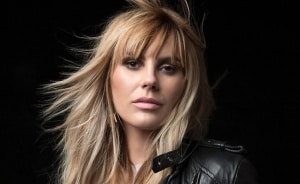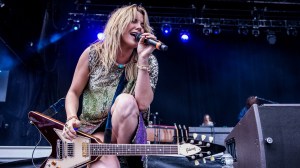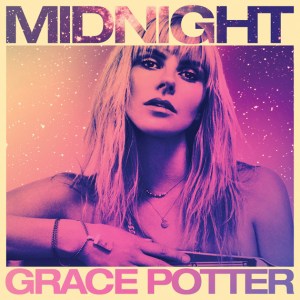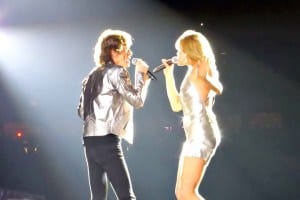Grace Potter: I Am Not Who I Was Before (Interview)
 It’s been a big year for Grace Potter. She’s stepped outside her long-time band, The Nocturnals, and made her first solo album, Midnight, much to the chagrin of many fans who were put off by the overt pop beats found on songs like the lead single, Alive Tonight. The Vermont native spoke to The 13th Floor’s Marty Duda ahead of her appearance at the upcoming Auckland City Limits Festival happening at Western Springs this March. Grace discusses her new sound and how she reacts to her own fans’ reaction.
It’s been a big year for Grace Potter. She’s stepped outside her long-time band, The Nocturnals, and made her first solo album, Midnight, much to the chagrin of many fans who were put off by the overt pop beats found on songs like the lead single, Alive Tonight. The Vermont native spoke to The 13th Floor’s Marty Duda ahead of her appearance at the upcoming Auckland City Limits Festival happening at Western Springs this March. Grace discusses her new sound and how she reacts to her own fans’ reaction.
Click here to listen to the interview with Grace Potter:
Or, read a transcription of the interview here:
MD: You’re in the middle of touring…you’re in the Northeast, in Huntington, New York, is that right?
GP: Yes, wow, you are GPS proximity accurate. That is exactly right.
MD: I’m not stalking you or anything, I’m just doing research.
GP: No, no, no, that’s good. I’m really happy to be here. Speaking of stalking, there’s like a creepy…secret Mafia room here, there’s also secret Shawshank Redemption rooms. The whole theatre is crazy; it’s very old and vaudevillian. Very cool.
MD: You’ve been playing in a lot of places like that from what I can see and you played in Asbury Park a couple of days ago.
GP: Yes!! Oh my God, it was so haunted. It was crazy. Where are you from, originally?
MD: I’m from Rochester, New York.
 GP: So you know Asbury Park. That whole Atlantic City, and the whole Jersey shore has a lot of ghosts and a lot of creepy history to it, from the prohibition era. So, I didn’t really realize all the depths of it until I got there. We got haunted, it was spooky.
GP: So you know Asbury Park. That whole Atlantic City, and the whole Jersey shore has a lot of ghosts and a lot of creepy history to it, from the prohibition era. So, I didn’t really realize all the depths of it until I got there. We got haunted, it was spooky.
MD: Well I did watch Boardwalk Empire so I’ve got a good idea…
GP: Yeah, exactly, you know, you know. (laughs)
MD: How did the show go?
GP: It was fantastic. Oh my God, the crowd was crazy. You know, I forget how close we are to New York City too, so there’s a lot of that energy from the city. But the fans are amazing, they’re just so devoted and so, ahh…they’re kind of ready, at this point, for whatever’s going to happen. I think people have learned now to expect the unexpected with me. (laughs)
MD: There’s a lot of that these days, isn’t there?
GP: That’s exactly right, yeah.
MD: Speaking about that, has it been…we won’t go into the whole, you’re on your own now and how does it feel, because I have a feeling you’ve probably been talking about that for months now. I guess I’m interested in what it’s like being on the road and being the solo artist rather than part of a band and how that affects the way you approach the day to day things. You don’t have to talk to somebody about a set list, you can do what you want. How does it affect your performance and just being on the road now?
GP: I guess there’s no reason that anybody would know this but, even when I was in The Nocturnals that was really what my job was. I already always did all those things and it was just really my thing. So, that was part of the solo record, doing what I was doing. It’s not about staking a claim or saying it was all me all along but we did lose that democracy really early on. I think we figured out, right around the time of maybe 2005 or 6, right when we started touring nationally, that every great company, whether it’s a music…like a band or a film production crew or an artist or an incredible architect…in the creative field you do actually need a leader and so all along I really was kinda doing those things already. So now, not much has changed. It’s just in a name…it’s what’s in a name. Because when it was Grace Potter & The Nocturnals I think people though it was a slightly more collaborative experience than it really was. That’s not to say that those people aren’t…they’re my best friends and it’s family…but it’s amazing how quickly whatever band you’re in, or whatever production crew you’re in, or whatever any project you’ve ever done or summer camp you’ve ever been to as a child…those people become the closest people to you. You can always tell because you look at people’s weddings and you see who shows up at the wedding and every single person I’ve ever talked to, there’s like some really embarrassing wedding photos, and the bride or the groom will say, “Oh yeah, that was twenty years ago, I don’t even know why I invited her. I met her in Puerto Rico at my bachelorette party and I decided to invite her to the wedding. I’m not sure what she’s doing there”. But they become a part of your history. They become part of your story and, no matter what you do, they are part of you. So, I really appreciate that, I embrace that, and I also respect it because as I’m in this new conglomerate with this new group of incredible musicians…there’s seven of us now, actually eight of us…and that group and that collective has become my family and my sort of new incubator of really amazing personalities and talented people. So it doesn’t feel different at all and I’m very surprised to say that, but it really doesn’t. It’s just an experience.
MD: Has it’s changed…because it’s different people that you’re working with, and from hat I understand, the instrumentation is different than it was with The Nocturnals…has it changed music-wise or performance-wise, what you’re doing on stage?
 GP: Not really. The only difference is that there’s more vocals now. That’s the big thing I was gunning for. The instrumentation hasn’t changed, there’s still two guitars, sometimes three guitars. The only difference is I added a keyboard player and I added a percussionist so there’s two additional instruments that are doubling down on what’s already on stage. So, on a musical level, it’s actually created this incredible intensity to the dynamic because with four people, or five people on stage, you know that you’ve got very, very specific skill-sets and you want to make sure that everyone who’s playing a part is playing exactly what they need to play. And so, that sound is being filled out in a way that it never got filled out before. We’re able to really add to the dimension of the show by having layers of sound. Even when it gets really quiet there might still be like a keyboard pad going underneath it, but if I’m out front dancing around like Mick Jagger, I can’t be playing keyboard pads, so now I’ve got someone doing that for me. It’s really wonderful in that way.
GP: Not really. The only difference is that there’s more vocals now. That’s the big thing I was gunning for. The instrumentation hasn’t changed, there’s still two guitars, sometimes three guitars. The only difference is I added a keyboard player and I added a percussionist so there’s two additional instruments that are doubling down on what’s already on stage. So, on a musical level, it’s actually created this incredible intensity to the dynamic because with four people, or five people on stage, you know that you’ve got very, very specific skill-sets and you want to make sure that everyone who’s playing a part is playing exactly what they need to play. And so, that sound is being filled out in a way that it never got filled out before. We’re able to really add to the dimension of the show by having layers of sound. Even when it gets really quiet there might still be like a keyboard pad going underneath it, but if I’m out front dancing around like Mick Jagger, I can’t be playing keyboard pads, so now I’ve got someone doing that for me. It’s really wonderful in that way.
MD: I’m wondering how much interaction you have with fans. Obviously some people are going to be thrilled with what you’re doing and how things have changed and some people are going to be stubborn and complaining that it’s not like it used to be. How much gets filtered back to you and how much do you take on board?
GP: Oh, I don’t take any of it on board! I mean, you can’t, you can’t. If I took it on board…I know musicians who do that…there’s a lot of musicians out there that are insanely…they spend all night on the message board like reading comments. I’m not sure if you know this…I think we had this conversation last time…but I don’t read any of those comments. I don’t read any of the articles that get written about me either, I just look at pictures because I’m shallow. (laughs) No, no, it’s really there’s more intention to it…I don’t care, I really don’t care. I don’t care about somebody else’s baggage that they have put on me. It’s not my business. Again, this is the same thing with anybody in life You know a lot of times a boss, or an employee…like the boss will come over and be really mean or awful to an employee. That employee thinks, “Oh my God, I’m doing a bad job and I’m a bad person because the boss just got mad at me”. But really, what it is is, it’s a relationship where half the time the person that you’re hearing and the anger that you’re hearing or the energy that you feel is unfortunate or upsetting…it’s kind of someone else’s shit, they attached to you. They put it on you as their problem that they need to solve. So, I’ve learned to fluff it off and be a little bit of a seal. They say it’s the seal effect because seals can wick…they wick the water away. But it doesn’t mean that I don’t recognize that I’m in the water. And so, I definitely acknowledge it for what it is, but you have to be impervious to that kind of emotional baggage. And so a big part of this process of becoming a solo musician has been about me doing that for myself more than it is trying to coax the fans into liking me or not liking me. I don’t really need that. I don’t need the affirmation of a bunch of strangers. You love it because it moves you and it moves your heart. And whether you followed me for a year or ten years, the music will do the work for me. I don’t need to coax people into liking it or not liking it. Having said that, I honestly work really, really hard on stage and spend my life sharing love that I feel. And so one of the most amazing experiences I’ve had with this process is meeting and talking to the fans who didn’t really want to come to the show at all. They’re like angry and they’re over it and they’re mad at me and they’re like, “You’ve totally sold out, you went pop”. These are ballsy motherfuckers that come up to me and say that. You’re asking how many people, how much has come back to you, of course people have come up to me and said that. What’s interesting is that they come to me and they say that and then they literally, in the same breath, they’re like, “I came here to be mad at you, when I first heard Alive Tonight and I heard that you went solo I was really, really angry, but this is my favourite record that you’ve ever made and I listen to it three times a day”. Or, or, or…”That one song changed my live and my mom just died and so this song is just so exactly what I needed to hear right now”. Or, they just go back to that place of realizing that I’m also a human and I’m also hurting and going through pain and feeling all the changes that everyone else is feeling and I’m not doing it because I’m sadistic. It’s more like I absolutely, positively had to do it for my life to understand and conquer then unknown. And the unknown for me has always been, “What would happen if I struck out on my own?” I’ve wanted to do it before, I just haven’t had the balls until now.
 MD: And I guess, obviously, music is littered with people who have been changing their styles…David Bowie is a perfect example, Madonna’s another…two of the folks I think you’ve mentioned in interviews and things.
MD: And I guess, obviously, music is littered with people who have been changing their styles…David Bowie is a perfect example, Madonna’s another…two of the folks I think you’ve mentioned in interviews and things.
GP: Sure.
MD: I guess the difference between them and you is that you had this very established thing that you were doing for quite a long time that fit really neatly into what people assumed was what you were about and they identified with it and they just expected you to just continue on your merry way like that, whereas with David Bowie you knew right from the beginning he was going to go off and do something weird.
GP: It’s interesting because I feel like every record I’ve ever made did kind of make a leap, it’s just that I was leaping from a much different spot. Because Bowie came from pop so every time he made something different he was still coming from the context of already wanting to be a pop star, where I came from a place…you know, I come from Vermont where it’s actually not cool to do anything else. It’s not cool to even say the words pop music. And so I’m growing from a place where maybe it does actually take you ten years to evolve from the back porch to the front of an arena stage. And that’s really what’s happened. That process was very slow for me and maybe that was partly an emotional journey for me, just accepting in my heart of hearts I had been listening to Madonna the whole time. (laughs) But I do think that those little clues are in there. If you listen back through The Nocturnals’ music, you can definitely hear it. It’s not like this is just a…I pulled the curtain on one era n I’m opening up another era. You can definitely hear it coming even with the work that I did with Dan Auerbach and Mark Batson. You can hear those beats in some of that more dance-y material and some of those poppier hooks, even with the guitar parts. You can hear a lot of the music shifting in the process. But each of those steps we made from one album to another, they were pretty subtle, but this step felt extreme enough that I had to kind of recognize it. It wasn’t the same thing. This was a big rip, as the scientists refer to it. This is that moment. It wasn’t, you know…I am not who I was before, and I say that in the lyrics of What We’ve Become. I am actually a different person than I was when I was 19, founding a band based on listening to records and trying to emulate acoustic performers. Everything has changed for sure.
Click here to listen to Look What We’ve Become from Midnight:
MD: You mentioned Vermont, and if I’m not mistaken, you had a day off in Vermont a few days or weeks ago…
GP: I did! I did, just two days ago, yeah.
MD: So how was that? Was it kind of like a little homecoming? Was it just relaxing? Did you have to tell people why you’re doing what you’re doing now?

GP: People are very understanding in Vermont. I came from that hippie commune atmosphere so nobody who knows me at all…like if you know me and if you’ve seen me and watched me growing from a young person into a teenager into a very, very studious, collegiate…a person thought that I was going to become an academic for a hot second there. I thought I wanted to be an actress, thought I wanted to do this, that. I’ve always been this way; it’s always been a part of me so nobody is even the least bit surprised. They’ve been incredibly accepting. That doesn’t mean that they’re “yes” people. These are the people that have known me from the very beginning and they’re just not surprised. Nobody is surprised. It’s funny, because that’s not the reaction I want, I want people to be surprised. So going home is always humbling because people will look at me and, “Well yeah, of course you’re going to do that”. They know me better than anybody.
MD: It’s weird, I grew up in Western Pennsylvania, very rural, and I was just back there a couple months ago and it was so weird, you know. I hadn’t been there in like 50 years and you’re immediately back to where you were when you were ten years old.
GP: That’s a good thing to revisit, but I don’t think you need to define yourself by it and I imagine living halfway across the world and spending your time doing a lot of different things than maybe what the people you grew up with are doing now…but you see as well that defying expectations is one of the most gratifying things that you can do.
MD: Speaking of expectations, you’re going to be here in a couple of months, an you’re playing as part of a festival thing, and I’m wondering what people can expect from you because they don’t have the same expectations because I don’t think you have the same kind of hard core long-running fan base that you have in the US because you haven’t played here very…you’ve only been here once. So does that affect how you’re going to approach what you’re going to do when you come here?
GP: Yeah, I mean, it’s great for me because I’m starting clean and in a lot of ways that’s what I feel my life is about right now. Actually I feel like this is an opportunity for me to really engage in the exact thing I was gunning for when I started writing this album which is just the unexpected and beautiful parts of life where, as humans, we get X amount of time on this Earth where our bodies are going to function, enough to even be doing a windmill on the guitar. So I love that I can come to a country where I have very limited expectations on me, other than people know that I write songs n that I sing and I work really hard on stage because I love it and it’s something that inspires me and that I will never lie to the fans. That’s why this whole thing is happening because to put this record out and call it a Nocturnals record would have been a lie. It would have been me saying, “Ok people, I would rather sell a bunch of tickets and do well and continue on this engine that I’ve built, than to tell it like it is and say this is different and this is not The Nocturnals”. So in the same way, coming to a country where they’ve only seen me once, maybe twice, it gives me an opportunity to really give you the most honest version of myself and I’m really, really excited about that. I feel that it’s invited and I feel the festival has been set up for that. This is a real excursion into quality music in a quality city with quality people who can tell the difference. I feel that that’s the one thing I love, more than anything about New Zealand, is that they can…you guys can smell it when it’s not real. (laughs)
- Challengers – Dir: Luca Guadagnino (Film Review) - April 24, 2024
- Civil War – Dir: Alex Garland (Film Review) - April 9, 2024
- Pearl Jam – Dark Matter (Monkeywrench/Republic) Album Review - April 1, 2024
